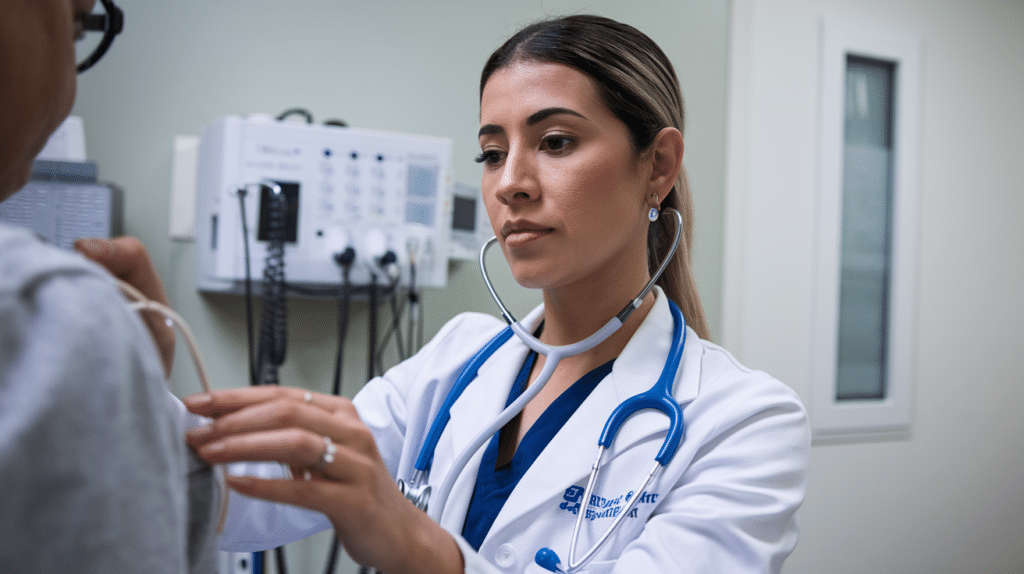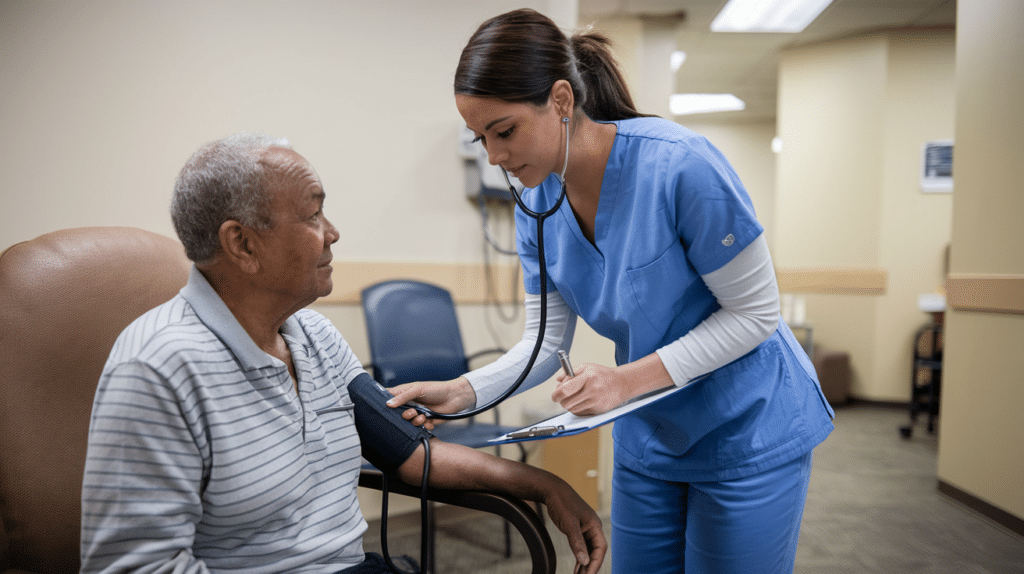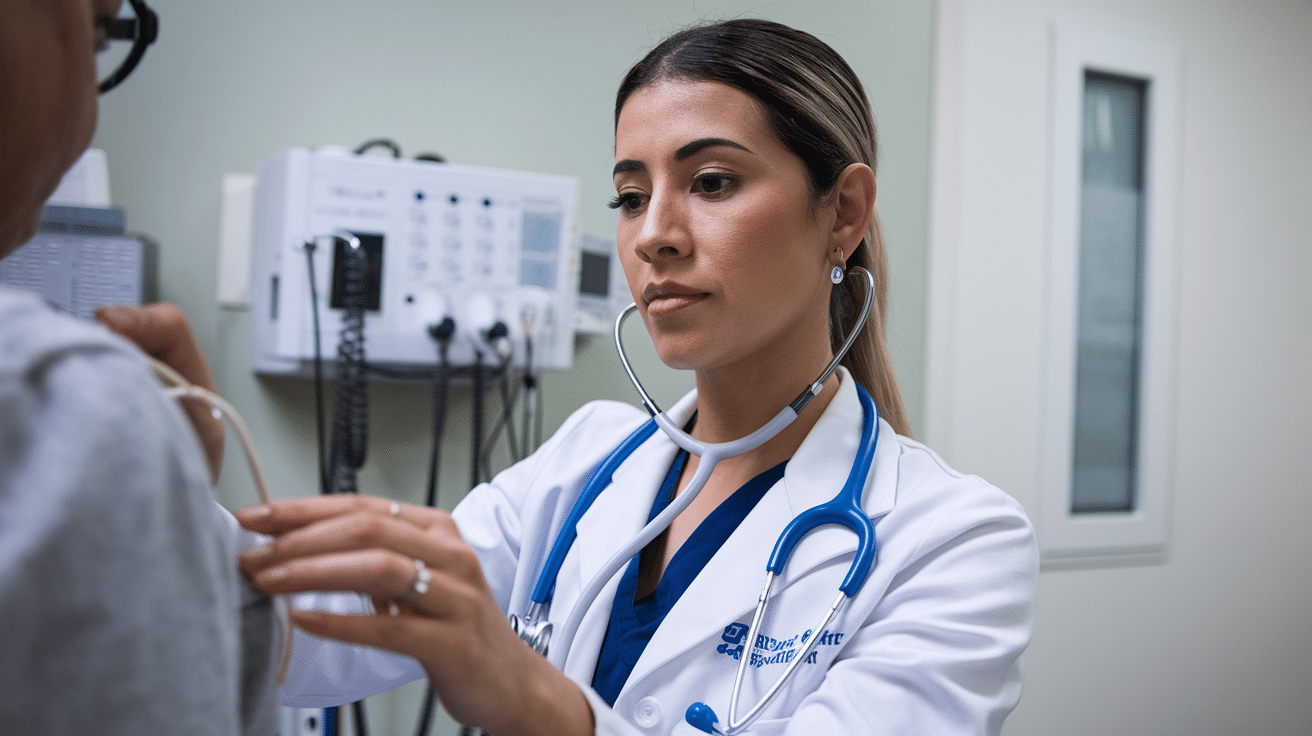If you’re looking to start a career in medical assisting and are interested in helping patients with heart conditions, then a career as a Cardiology Medical Assistant could be perfect for you.
This specialized role allows you to work closely with cardiologists, helping patients with cardiovascular issues.
So, in this article, we’ll discuss Cardiology Medical Assistants, their work environment, salary, job prospects, job duties, and skills.
Moreover, we’ll also discuss a day in the life of a Cardiology Medical Assistant so you’ll have a proper understanding of how the career really is.
Plus, we’ll share a step-by-step guide to help you understand how you could start your career as a Cardiology Medical Assistant in as little as 6 months.
So, let’s get started.

What is a Cardiology Medical Assistant?
A Cardiology Medical Assistant is a specialized type of medical assistant who works closely with cardiologists to support the care of patients with heart-related issues.
They assist in various clinical tasks like administering diagnostic tests such as EKGs, preparing patients for cardiac procedures, monitoring vital signs, and educating patients about heart health.
Their work requires a strong understanding of cardiac health and diagnostic tools, making them valuable members of the healthcare team in cardiology practices, hospitals, and specialty clinics.
Where Do Cardiology Medical Assistants Work?
Cardiology Medical Assistants work in various healthcare settings, primarily supporting cardiologists in diagnosing and treating heart-related conditions.
Their work environments include:
Cardiology Clinics
These specialized outpatient facilities focus on diagnosing and treating heart conditions. Medical assistants in these clinics often handle both administrative and clinical duties.
They manage patient scheduling, assist with cardiac exams, and perform tests like EKGs and stress tests.
Hospitals
Cardiology medical assistants in hospitals support inpatient cardiac units or outpatient cardiology departments.
They assist with preparing patients for procedures, documenting vital signs, and conducting cardiac tests under supervision.
The fast-paced environment of a hospital means assistants may deal with emergencies, making this setting more intense.
Private Practices
Some cardiology medical assistants work in private cardiology practices, where they may take on a more personalized role with patients.
They help maintain records, assist in examinations, and manage follow-up appointments in smaller, close-knit teams.
Diagnostic Laboratories
In these settings, medical assistants may focus more on performing diagnostic tests, such as EKGs or Holter monitoring.
Their primary role here is to support the cardiologists and technicians who analyze the results.
Outpatient Care Centers
Many cardiac patients require outpatient treatment, including routine checkups and rehabilitation.
Cardiology medical assistants in these centers assist in managing patient care and performing preliminary exams in a more relaxed, scheduled environment.
Earning Potential
The salary of a Medical Assistant can vary based on factors such as geographic location, level of experience, and area of specialization.
As of 2023, data from the U.S. Bureau of Labor Statistics indicates that the median annual wage for Medical Assistants is approximately $42,000.
The highest earners can make over $56,480 annually, while those on the lower end of the scale typically earn less than $33,500.
Medical Assistants working in cardiology often start with hourly wages ranging from $18 to $20. In addition, many cardiology-focused job postings highlight sign-on bonuses of up to $4,000.
Certified Cardiology Medical Assistants generally enjoy higher pay than their non-certified counterparts, making certification a valuable asset for career advancement.
Job Prospects
The demand for Medical Assistants is projected to rise significantly in the coming years.
According to the U.S. Bureau of Labor Statistics, employment for Medical Assistants is expected to grow by 15% from 2023 to 2033, creating approximately 119,800 new job openings annually over the next decade.
This increase is largely driven by an aging population that requires more healthcare services and the expanding role of healthcare facilities.
What Does a Cardiology Medical Assistant Do?
Cardiology Medical Assistants are a crucial part of the heart healthcare team, offering both hands-on patient care and ensuring smooth clinical operations in the cardiology department.
Their primary focus is on helping patients with heart conditions, assisting in diagnostic procedures, and maintaining patient care records.
Let’s discuss the duties of a Cardiology Medical Assistant –
Assisting in Diagnostic Tests
One of the key responsibilities is conducting and assisting with heart-related diagnostic tests, such as electrocardiograms (EKGs).
For example, a cardiology medical assistant might prep the patient for an EKG, place electrodes on the patient’s chest, and monitor the readings.
They also assist during stress tests, ensuring patients are comfortable and safe during physical exertion.
Patient Interaction and Education
Cardiology Medical Assistants work directly with patients, explaining procedures and making them feel at ease.
They might instruct a patient on how to wear a Holter monitor, a device used for continuous heart monitoring, or offer guidance on managing conditions like hypertension.
This educational aspect ensures patients understand their health conditions and treatment plans.
Monitoring Vital Signs
Monitoring vital signs is an essential duty, including checking blood pressure, pulse, and respiration, especially before procedures like cardiac catheterizations or echocardiograms.
For example, they may track a patient’s vitals before and after a stress test to observe any abnormal changes in heart function.

Assisting in Cardiac Procedures
During more invasive cardiac procedures, such as angiograms or catheterizations, a Cardiology Medical Assistant helps the cardiologist by preparing tools and ensuring all necessary materials are sterile and ready.
They may also help monitor the patient’s condition during these procedures, providing a second pair of hands in a busy, high-pressure environment.
Administrative Tasks
On the administrative side, they manage patient records, schedule appointments, and ensure the cardiologist has the necessary medical history before procedures.
For example, organizing records for follow-up visits after a heart attack helps the cardiologist monitor the patient’s recovery effectively.
Skills of a Cardiology Medical Assistant
A Cardiology Medical Assistant requires a unique blend of technical and interpersonal skills to effectively support both the cardiologist and patients.
Their role goes beyond routine administrative tasks to include specialized responsibilities related to heart health.
Let’s discuss the skills of a Cardiology Medical Assistant –
Technical Proficiency in Cardiac Testing
Cardiology medical assistants must be skilled in conducting and interpreting tests like electrocardiograms (EKGs), stress tests, and Holter monitoring.
For example, they need to know how to place electrodes accurately during an EKG to ensure correct readings. This skill is essential as the cardiologist relies on these test results to diagnose heart conditions.
Attention to Detail
In cardiology, even small inaccuracies can lead to significant consequences.
For instance, when preparing a patient for a cardiac procedure, a cardiology medical assistant must ensure that all instruments are sterilized and that patient vitals are recorded precisely.
This attention to detail helps prevent errors and improves patient outcomes.
Effective Communication
Cardiology medical assistants often serve as the bridge between patients and the cardiologist.
For example, after an appointment, the assistant might explain how to use a Holter monitor or provide instructions for post-procedure care.
Clear communication helps patients feel informed and reassured, particularly in high-stress situations like heart treatments.
Empathy and Patient Care
Working with cardiology patients can be emotionally challenging, as patients may be dealing with serious or life-threatening conditions.
A cardiology medical assistant needs to show empathy and patience when interacting with anxious patients.
For example, calming a patient down before a stress test or offering reassurance during a procedure requires emotional intelligence and a caring demeanor.
Multitasking and Organizational Skills
Cardiology medical assistants are responsible for handling multiple tasks simultaneously, from managing patient appointments to assisting with procedures.
For example, in a busy cardiology office, they might need to balance checking patient vitals, scheduling follow-up appointments, and preparing medical records for the cardiologist.
Being able to prioritize and manage time efficiently is critical in such a dynamic environment.
Basic Knowledge of Cardiology
While cardiology medical assistants are not cardiologists, they must have a foundational understanding of heart conditions and treatments.
This knowledge helps them better assist during procedures and explain basic medical information to patients.
For instance, knowing the difference between arrhythmias and heart attacks can help them respond appropriately in emergencies.
How To Become a Cardiology Medical Assistant?
Becoming a Cardiology Medical Assistant involves a series of well-planned steps, each designed to prepare you for a rewarding career in this specialized field.
Here’s a step-by-step guide on how you can pursue this path:
Step 1 -> Get a High School Diploma
The first step to any medical career is ensuring you have a solid educational foundation, which starts with a high school diploma or an equivalent, such as a GED.
While in high school, taking courses in biology, anatomy, and chemistry can give you a head start, as they will lay down the fundamentals you’ll need in medical assisting.
Step 2 -> Enroll in a Medical Assistant Program
Once you have your diploma, it’s time to focus on formal training. A medical assistant program will teach you the necessary skills for patient care, administrative duties, and clinical tasks like drawing blood and preparing lab samples.
However, you have to choose the right type of program. Traditional full-time programs, while thorough, can be time-consuming and expensive.
Most of them also require you to attend on-campus classes, which may not be feasible if you have work or family obligations.
An alternative to this is an online, self-paced program. These programs allow you to learn at your own speed, making them more suitable for working adults.
Talking of online programs, Preppy’s Self-Paced Medical Assistant Training Program is one of the standout options in this category.
Here’s why industry veterans and students recommend Preppy’s program:
- Preppy’s program offers 100% online, self-paced learning, which allows you to balance other responsibilities while studying.
- You’ll earn a certificate from the highly reputable, 150-year-old Auburn University, an accredited, non-profit institution.
- You’ll gain real-world experience with an externship opportunity at a local medical facility.
- The program could make you ready for the Certified Clinical Medical Assistant (CCMA) exam, a critical certification in the field.
- At only $1599, it’s significantly more budget-friendly than traditional programs.
- You could complete the program in as little as 4 months, which means you could start your career sooner.
- Plus, you get 24/7 support for both technical and course-related queries.
- Lastly, at this time, if you enroll in our program there’s a bonus where you can get a free laptop, and that’s yours to keep even after completion of your program.
So, if you want to become job-ready faster at an affordable price, without driving to college or without a student loan, then Preppy’s Self-Paced Medical Assistant Training Program could be the best option.

Step 3 -> Complete the Coursework
During your program, you’ll complete a series of modules that cover a wide range of medical and administrative skills.
This will include everything from understanding medical terminology to learning how to take vital signs and prepare patient records.
The beauty of a self-paced program is that you control the timeline, making it easier for you to focus on areas you find more challenging without the pressure of a fixed classroom schedule.
This flexibility helps adult learners or those juggling other responsibilities to stay on track with their studies.
Step 4 -> Get Externship Experience
Hands-on experience is crucial in the medical field. Once you’ve completed your coursework, you’ll participate in an externship at a healthcare facility.
Here, you’ll get to apply the knowledge you’ve gained in a real-world setting. The practical experience during the externship gives you confidence and better prepares you for future employment.
Preppy’s program helps secure an externship placement close to your location, ensuring you can gain this valuable experience without having to travel long distances.
Step 5 -> Prepare and Get CCMA Certified
To maximize your employability and earning potential, getting certified is highly recommended.
The CCMA (Certified Clinical Medical Assistant) certification, offered through the National Healthcareer Association (NHA), is one of the most recognized credentials in the medical assisting field.
Having this certification shows potential employers that you have the skills and knowledge needed to perform in clinical settings.
Certification also sets you apart from those who are not certified, giving you an edge when applying for jobs.
Step 6 -> Work as a Medical Assistant
With your CCMA certification in hand, you’re now ready to start working as a general Medical Assistant.
This experience is critical as it helps you become proficient in basic medical assistant duties such as taking vital signs, assisting with examinations, and preparing medical histories.
Gaining this practical experience is an important stepping stone toward specialization, as many employers in cardiology look for candidates with a background in general medical assistance.
Step 7 -> Get EKG Certification
If you want to specifically work in cardiology, earning an EKG (Electrocardiography) certification is essential.
The Certified EKG Technician (CET) credential, also offered by the NHA, is an excellent way to gain the specialized skills needed to work in a cardiology clinic.
This certification teaches you how to perform EKGs, which are crucial diagnostic tools used in cardiology to assess the electrical activity of the heart.
Having this additional certification makes you more attractive to employers in the field of cardiology.
Step 8 -> Transition into a Cardiology Specialization
After gaining experience as a Medical Assistant and obtaining your EKG certification, you can start exploring job openings specifically in cardiology.
Many professionals begin in general medical assistant roles and move into cardiology when an opportunity arises.
Having the EKG certification and prior experience will make you a strong candidate when the opportunity to specialize in cardiology presents itself.
So, following these steps ensures that you have the skills and experience needed to thrive in this specialized field. With the right education, hands-on training, and certification, you can embark on a fulfilling career that combines patient care with cutting-edge cardiovascular diagnostics.
A Day in the Life of a Cardiology Medical Assistant
A day in the life of a Cardiology Medical Assistant is both dynamic and engaging, filled with meaningful interactions and critical tasks that directly impact patient care.
The day usually starts early, with the assistant arriving at the cardiology clinic or hospital to prepare for the day’s schedule.
Before patients arrive, they might review the day’s appointments, ensuring all necessary equipment, such as electrocardiogram (EKG) machines and patient files, are ready.
Organization is key, as cardiology assistants often manage a steady flow of patients, each requiring different levels of care.
Once patients begin arriving, the medical assistant’s role shifts to patient interaction. They greet patients, verify their medical histories, and ensure that all prior test results are available for the cardiologist’s review.
In cardiology, this often means reviewing heart-related conditions, medications, and past procedures. For patients experiencing chest pain or other heart-related symptoms, the assistant’s role becomes even more crucial as they help the cardiologist prepare for immediate testing.
Throughout the day, cardiology medical assistants perform a variety of clinical tasks. One of the key responsibilities is conducting EKGs to measure the electrical activity of the heart.
They explain the procedure to the patient, attach the necessary electrodes, and operate the machine.
Afterward, they ensure the results are properly recorded and forwarded to the cardiologist. In addition to EKGs, they may assist in other diagnostic tests, such as stress tests, or handle blood pressure monitoring and routine vitals.
Between patient appointments, a cardiology medical assistant also takes on administrative tasks. They may be responsible for scheduling follow-up appointments, updating medical records, and ensuring that insurance and billing details are accurate.
Their role requires constant multitasking, balancing clinical care with administrative duties, all while ensuring patients feel comfortable and informed.
As the day progresses, they often assist with more complex cases, such as prepping patients for invasive procedures like cardiac catheterization.
This could involve prepping the procedure area, briefing the patient, and ensuring all necessary materials and equipment are sterilized and ready for the cardiologist.
Toward the end of the day, they wrap up by updating patient charts, preparing for the next day, and possibly coordinating with labs or specialists for any additional patient needs.
In essence, a day in the life of a Cardiology Medical Assistant is fast-paced, highly varied, and deeply rewarding.
From patient interaction to hands-on diagnostic work, they play a vital role in the smooth functioning of a cardiology clinic, helping ensure that patients receive timely and efficient care.
Conclusion
Cardiology Medical Assistants are a crucial part of the heart healthcare team, offering both hands-on patient care and ensuring smooth clinical operations in the cardiology department.
We hope this article enlightens you on everything about Cardiology Medical Assistants, a day in their life, and how you can start this career faster.
Ultimately, if you want to become job-ready as a medical assistant faster without driving to college and without expensive tuition costs, then check out Preppy’s Self-Paced Medical Assistant Training Program.
Read More:
Medical assistant





